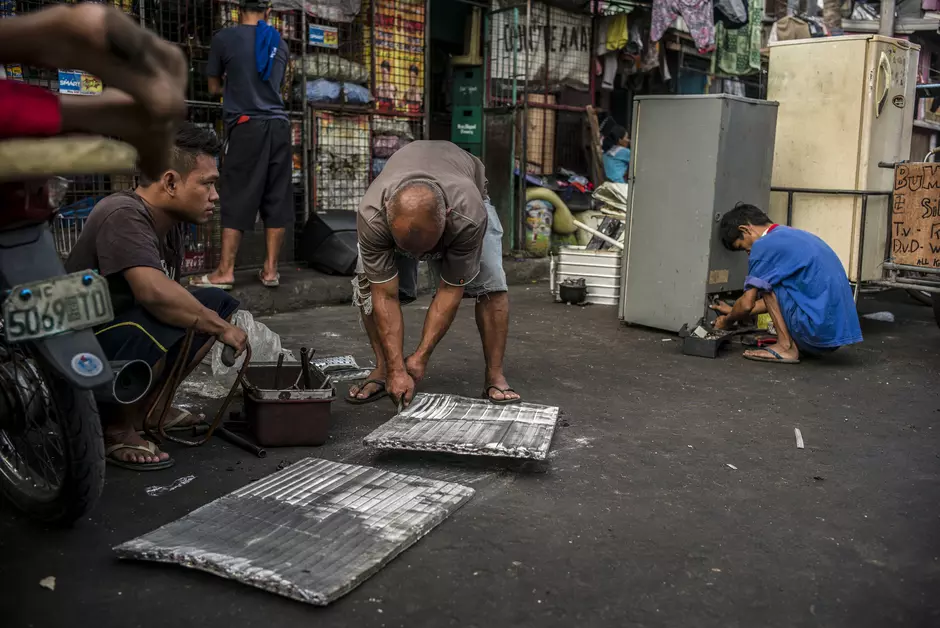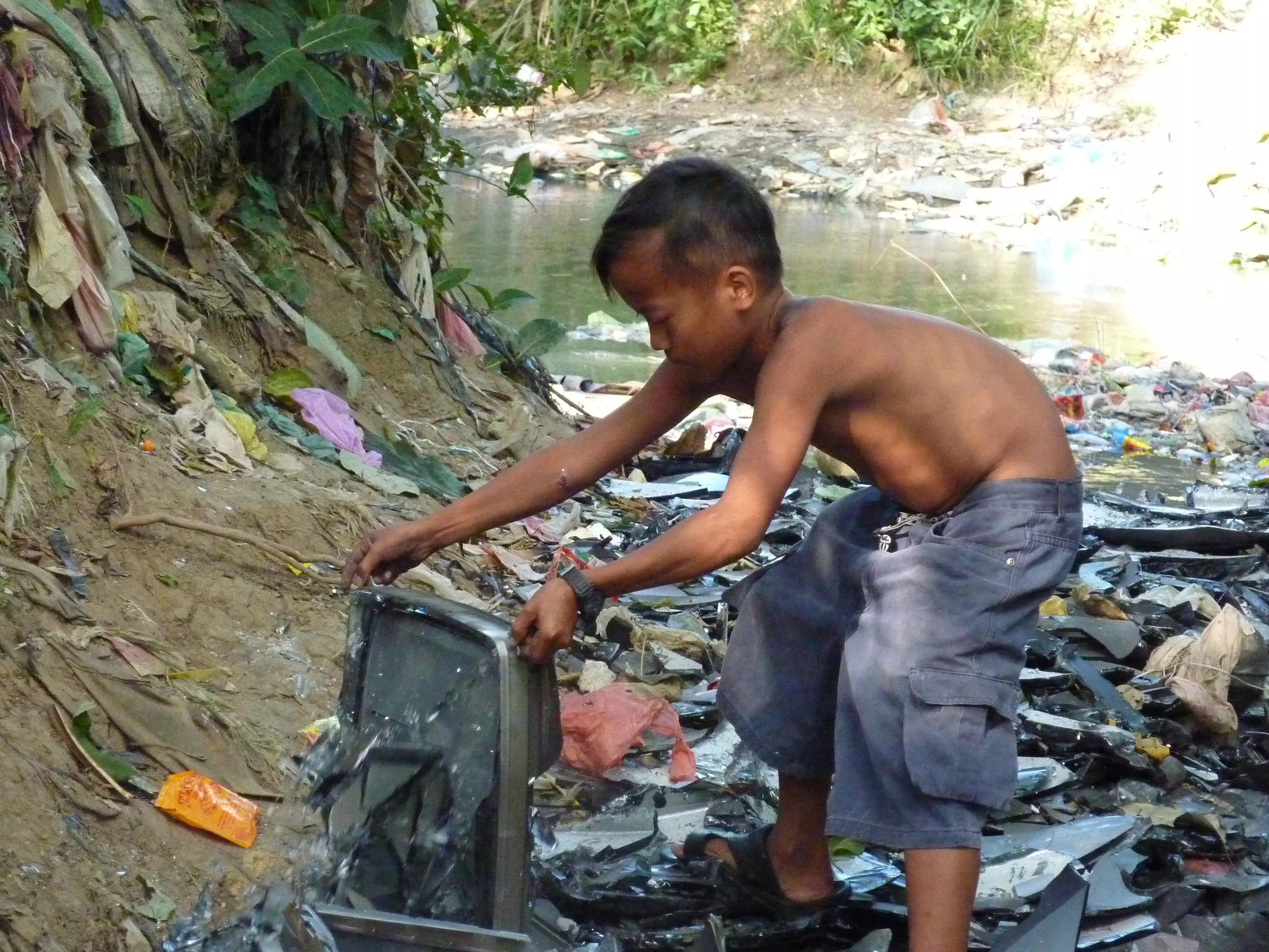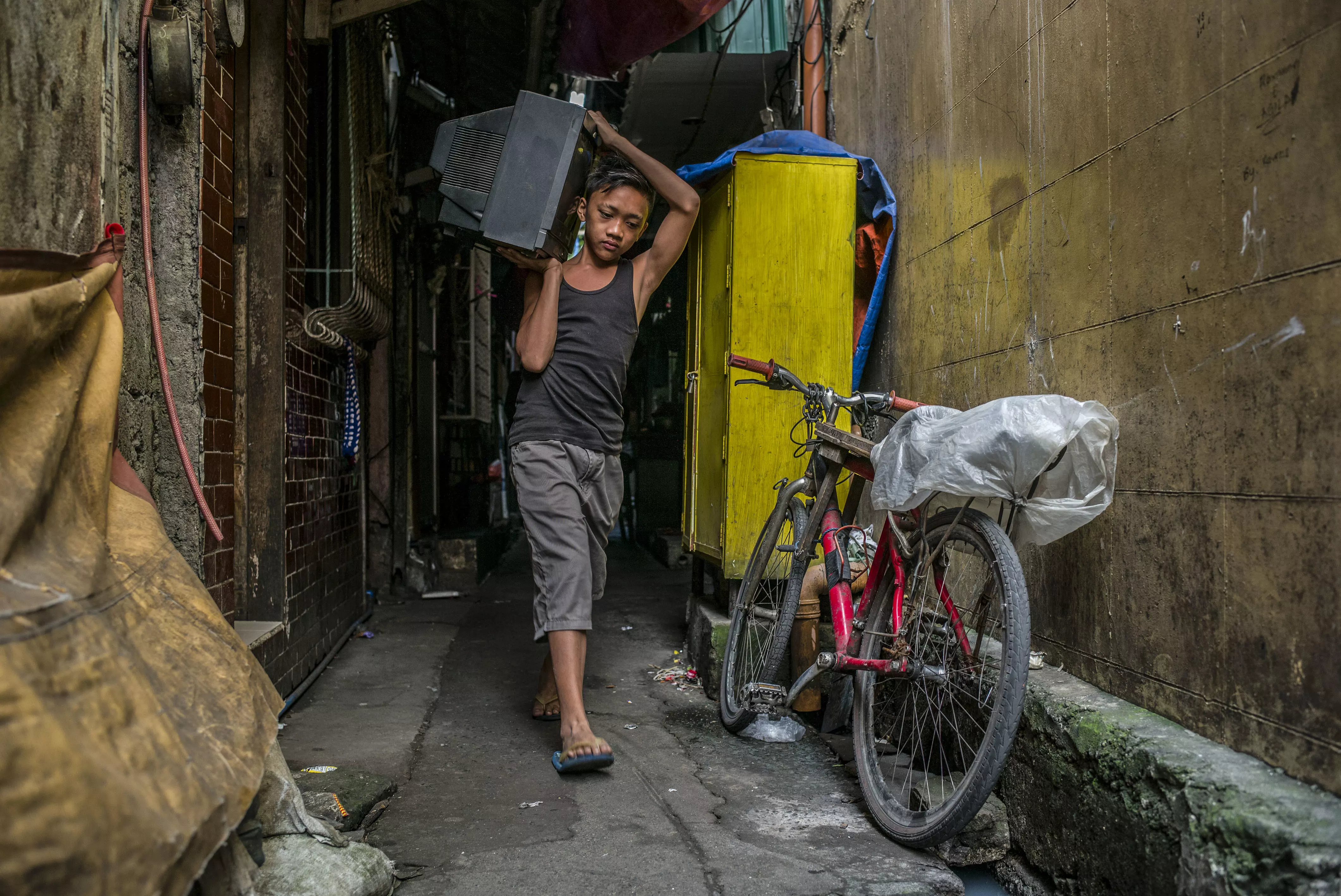
Humanitarian and Development
Place
Manille, Philippines
Sponsor
Françoise Weber
Grants
€50,000 granted by the 09/10/12 Selection Committee.
€150,000 granted by the 26/05/15 Selection Committee.
Project Leader
“This project tackles an important and often neglected issue: the recycling of toxic solid waste in developing countries.”
Françoise Weber
The Philippines had not considered the creation of a regulated sector to recycle air conditioners, refrigerators, CRT televisions, telephones, fans, etc. before 2017. Dismantlers of all ages, including children, extract valuable materials, mainly metals (copper, silver, aluminum, lead, etc.), from these materials. They sell them to local wholesalers (junk shops), who in turn sell them to regional wholesalers for export to developed countries where they are used as raw materials. Poor inhabitants of some barangays[1] dismantle WEEE for additional income or as a main activity to support their families.
Cornerstone of the partnership between MdM and the Foundation
In 2012, Médecins du Monde asked the Veolia Foundation to conduct a fact-finding mission on waste recycling in Manila. Attention was focused on WEEE, Veolia providing the expertise of its subsidiary, Triade Electronique, which specializes in WEEE treatment. During this first mission, both partners learned about the working conditions of dismantlers and identified the risks related to their practices. For example, they break cathode ray tubes to recover the lead inside. This results in dangerous glass shards, greenhouse gas and CFC[2] release, and lead taken into their bodies. By breaking other materials, pieces of metal scatter across the street. Dismantlers are therefore subject to two types of risk:
- Mechanical risks resulting from cuts and projections of metals.
- Risks of metal poisoning. The poisoning is direct or indirect when the metals (lead, cadmium, mercury, etc.) spread out in the environment or the water that dismantlers and their families drink.

This fact-finding mission was the cornerstone of the partnership between Médecins du Monde and the Veolia Foundation to reduce health and environmental consequences of informal WEEE dismantling in Manila. In 2012, the cooperation between an NGO and a company foundation was not necessarily an evidence... The two partners are very complementary: Médecins du Monde brings its concrete knowledge of the field, community structuring, and its aura with the local health authorities; Veolia brings its knowledge of dangerous practices in dismantling WEEE, personal protective equipment, and information and training messages. The project was intended to run for three years but was put on hold between 2013 and 2015 due to political and climate insecurity (numerous typhoons). It resumed in 2015 and ended in January 2017.
Structuring, training, and safety
The first phase of the project involved identifying risks and sites of action: four barangays with a large population of dismantlers. Médecins du Monde fostered the creation of four associations representing these informal workers. This organization fits into the favorable cultural context of a strong tradition of mutual aid in the Philippines.
The project in figures
- 4 sites of action
- 4 formal dismantler organizations
- 4 safe dismantling areas
- 766 dismantlers identified, of whom 57% belong to an organization
- 3,584 pairs of gloves handed out
- 2,200 people impacted by the project (dismantlers and their families)
- 5 information, education, and communication models created and 508 training sessions provided
- 50 health workers trained
- €300,000: financial support provided by the Veolia Foundation
The dissemination of prevention messages to workers on risks is greatly facilitated by this new organization. Volunteers from the Veolia Foundation formalized the messages in five modules which were then communicated to communities of dismantlers and local health authorities by the representatives of Médecins du Monde. It was also important to increase the awareness of the Philippine medical community about poisoning related to dismantling activities. The interaction between communities and health centers in barangays thus became more fluid.
Information, education, and training are the prerequisites to change daily practices. The Veolia Foundation financed personal protective equipment to reduce risks: gloves, goggles, and arm guards to be worn during dismantling. Screwdrivers were also distributed to unscrew cathode ray tubes rather than breaking them. An essential factor in changing practices was the creation of four Safe Dismantling Areas (SDAs) to be used instead of anywhere on the streets as before. Today, television cathode ray tubes are stored in dedicated cabinets, they are no longer strewn, broken, on the floor.

In 2017, the situation of dismantlers has begun to change. In 2016, a law was passed against the obstruction of streets in the Philippines and the police conducted raids to evict dismantlers. SDAs are protected by tents which must be folded every day, a law is being prepared to make informal dismantling illegal and this activity will only be authorized in junk shops, the fall in commodity prices has made the activity less profitable, therefore, some dismantlers have turned to other sources of income, and, of course, Médecins du Monde and the Veolia Foundation do not plan to support an activity that is going to become illegal.
Improving the health and environment of urban populations
Becoming aware of risks to health and the environment and changing behavior: these objectives of the partnership have been achieved. In three years, the mission has fostered real changes: dismantlers have been structured into communities, information has been given on the risks involved and it has been taken into consideration in daily practices, and safe dismantling areas have been created. This partnership also marks the beginning of an innovative and fruitful cooperation between a large NGO and a private group. Very active in humanitarian emergencies, Veolia has proved its ability to transfer its skills to a long-term development assistance mission.
Médecins du Monde and the Veolia Foundation are working together to define a new program linked to protecting the environment and the health of urban populations: access to water, sanitation, waste collection, fire protection, and access to healthcare. As in all megacities in developing countries, there are pockets of poverty and wealth in Manila. Infrastructure exists but the poorest people do not have access to it. The same methodology will be applied, namely community structuring to increase the impact of the actions carried out.
[1] Administrative authorities, equivalent to boroughs.
Médecins du Monde was founded in 1980 by a group of activist doctors to rescue Vietnamese refugees in the China Sea. The non-profit grew by taking action during the major crises of the 1980s in countries such as Afghanistan, El Salvador and Armenia. However, MdM also started working in France, opening a health centre and a first voluntary, anonymous and free HIV screening centre in Paris. In the 1990s, MdM provided assistance during the conflicts in the former Yugoslavia, Somalia, Rwanda, Burundi, Zaire/Congo, Iran, Kosovo, Turkey, Timor and Chechnya. In the late 1990s, more than 70 missions were accomplished across the world, in over 50 countries. In the 2000s, humanitarian action became increasingly difficult in the field, but Médecins du Monde has maintained its presence among the most vulnerable people worldwide.
In 2011, MdM ran 65 programmes in 44 countries, reaching 1.5 million beneficiaries across the globe.
The Foundation and its partner Médecins du Monde won a Ministry of Ecology, Sustainable Development and Energy award for their "Prevention and reduction of environmental risks among vulnerable communities in the Philippines” project.
Read our news item about the award.

